The Crucial m4 (Micron C400) SSD Review
by Anand Lal Shimpi on March 31, 2011 3:16 AM ESTAnandTech Storage Bench 2011: Much Heavier
I didn't expect to have to debut this so soon, but I've been working on updated benchmarks for 2011. Last year we introduced our AnandTech Storage Bench, a suite of benchmarks that took traces of real OS/application usage and played them back in a repeatable manner. I assembled the traces myself out of frustration with the majority of what we have today in terms of SSD benchmarks.
Although the AnandTech Storage Bench tests did a good job of characterizing SSD performance, they weren't stressful enough. All of the tests performed less than 10GB of reads/writes and typically involved only 4GB of writes specifically. That's not even enough exceed the spare area on most SSDs. Most canned SSD benchmarks don't even come close to writing a single gigabyte of data, but that doesn't mean that simply writing 4GB is acceptable.
Originally I kept the benchmarks short enough that they wouldn't be a burden to run (~30 minutes) but long enough that they were representative of what a power user might do with their system.
Not too long ago I tweeted that I had created what I referred to as the Mother of All SSD Benchmarks (MOASB). Rather than only writing 4GB of data to the drive, this benchmark writes 106.32GB. It's the load you'd put on a drive after nearly two weeks of constant usage. And it takes a *long* time to run.
I'll be sharing the full details of the benchmark in some upcoming SSD articles but here are some details:
1) The MOASB, officially called AnandTech Storage Bench 2011—Heavy Workload, mainly focuses on the times when your I/O activity is the highest. There is a lot of downloading and application installing that happens during the course of this test. My thinking was that it's during application installs, file copies, downloading and multitasking with all of this that you can really notice performance differences between drives.
2) I tried to cover as many bases as possible with the software I incorporated into this test. There's a lot of photo editing in Photoshop, HTML editing in Dreamweaver, web browsing, game playing/level loading (Starcraft II & WoW are both a part of the test) as well as general use stuff (application installing, virus scanning). I included a large amount of email downloading, document creation and editing as well. To top it all off I even use Visual Studio 2008 to build Chromium during the test.
Update: As promised, some more details about our Heavy Workload for 2011.
The test has 2,168,893 read operations and 1,783,447 write operations. The IO breakdown is as follows:
| AnandTech Storage Bench 2011—Heavy Workload IO Breakdown | ||||
| IO Size | % of Total | |||
| 4KB | 28% | |||
| 16KB | 10% | |||
| 32KB | 10% | |||
| 64KB | 4% | |||
Only 42% of all operations are sequential, the rest range from pseudo to fully random (with most falling in the pseudo-random category). Average queue depth is 4.625 IOs, with 59% of operations taking place in an IO queue of 1.
Many of you have asked for a better way to really characterize performance. Simply looking at IOPS doesn't really say much. As a result I'm going to be presenting Storage Bench 2011 data in a slightly different way. We'll have performance represented as Average MB/s, with higher numbers being better. At the same time I'll be reporting how long the SSD was busy while running this test. These disk busy graphs will show you exactly how much time was shaved off by using a faster drive vs. a slower one during the course of this test. Finally, I will also break out performance into reads, writes and combined. The reason I do this is to help balance out the fact that this test is unusually write intensive, which can often hide the benefits of a drive with good read performance.
There's also a new light workload for 2011. This is a far more reasonable, typical every day use case benchmark. Lots of web browsing, photo editing (but with a greater focus on photo consumption), video playback as well as some application installs and gaming. This test isn't nearly as write intensive as the MOASB but it's still multiple times more write intensive than what we were running last year.
As always I don't believe that these two benchmarks alone are enough to characterize the performance of a drive, but hopefully along with the rest of our tests they will help provide a better idea.
The testbed for Storage Bench 2011 has changed as well. We're now using a Sandy Bridge platform with full 6Gbps support for these tests. All of the older tests are still run on our X58 platform.
AnandTech Storage Bench 2011—Heavy Workload
We'll start out by looking at average data rate throughout our new heavy workload test:
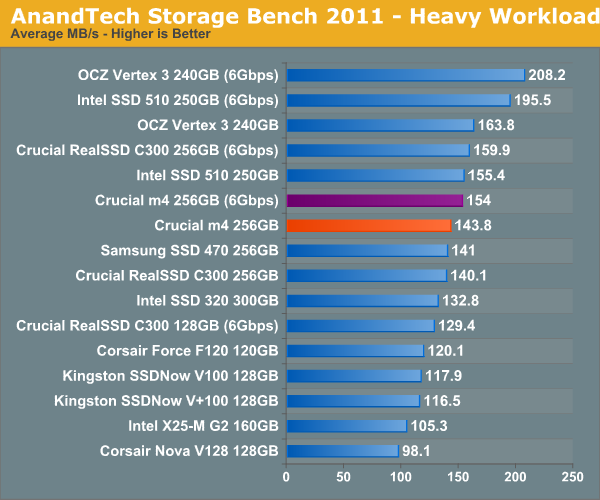
While we saw a pretty significant difference between 3Gbps and 6Gbps interfaces with the Intel 510 and Vertex 3, but the same can't be said about Crucial's m4. There's only a 7% performance improvement seen by using a 6Gbps connector on our Sandy Bridge system. Even more interesting is that performance actually drops a bit compared to the C300. We saw this in some of our synthetic Iometer tests and it's definitely reflected here.
The breakdown of reads vs. writes tells us more of what's going on:
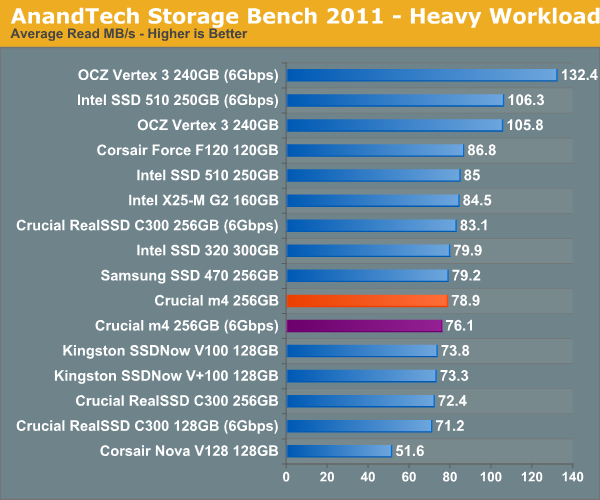
The drop in sequential and random read performance we noticed seems to be at fault for the m4's lower-than-C300 performance. Looking at write speeds we actually see an improvement over the C300:
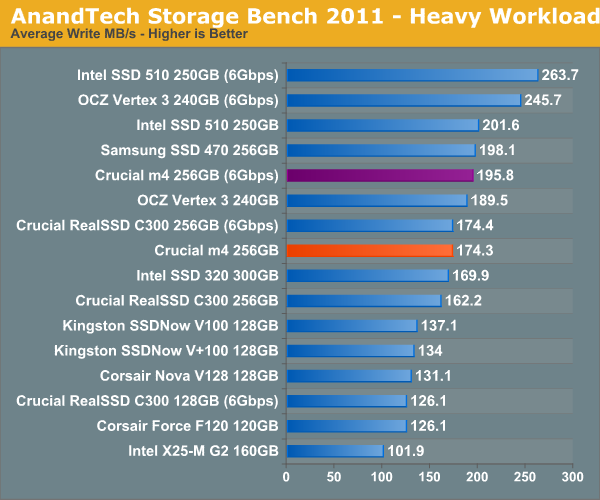
The next three charts just represent the same data, but in a different manner. Instead of looking at average data rate, we're looking at how long the disk was busy for during this entire test. Note that disk busy time excludes any and all idles, this is just how long the SSD was busy doing something:
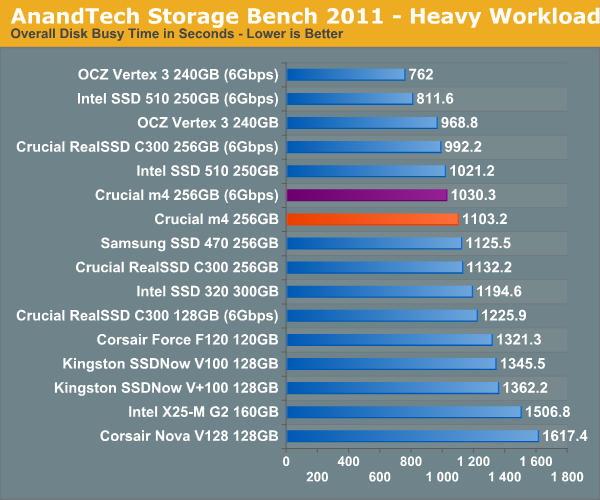
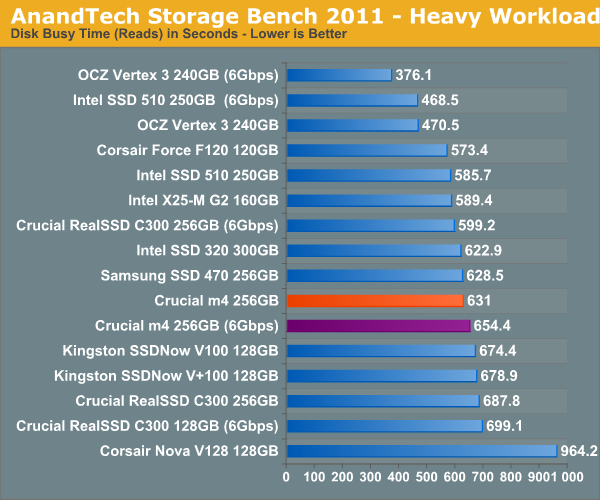
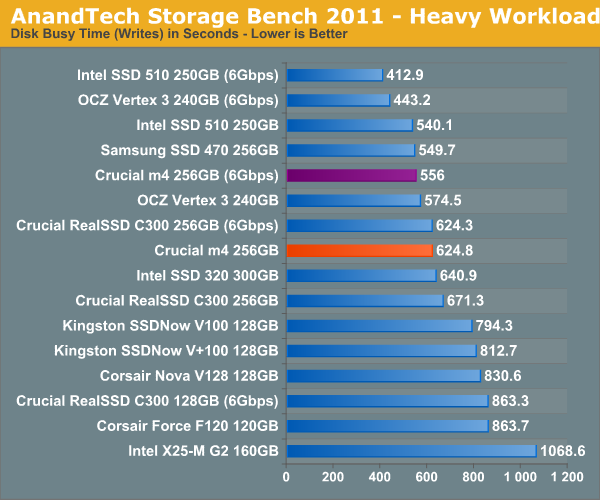










103 Comments
View All Comments
JNo - Thursday, March 31, 2011 - link
On another note, now that my system drive is an 80GB Intel X25M SSD, I really notice how my Documents folders that all have to be on mechanical HDDs due to their size, are very unresponsive. In fact often Win 7 hangs for about 10-15 secs just trying to open my Documents or Video folder when nothing else is going on! (This on a Core2 Q6600 so not a netbook or anything).Whilst I'm sure I would benefit from a 6Gbs controller and a Vertex 3 or m4, I wonder if the smart money in future will go on getting one or two cheap(er!) 40GB SSDs to act as cache drives for my couple of larger (1 - 2 TB) media and Documents drives. The figures on Tomshardware on Z68 caching performance were not awe inspiring but definitely a great option to have...
james.jwb - Thursday, March 31, 2011 - link
The HDD is probably going into sleep mode. Happens to mine all the time with an SSD. I hear it spin up as my PC is silent apart from the HDD. Could always turn it off or prolong it kicking in.strikeback03 - Thursday, March 31, 2011 - link
Seconded, I hear the same thing on my Win7 desktop with an 80GB X25M G2 and 3 mechanical HDDs. The HDDs go to sleep after 15-30 min, and take several seconds to spin back up when data is needed. It isn't enough of a bother to me to change the sleep time, but it can be done if necessary.softdrinkviking - Thursday, March 31, 2011 - link
Anand,you've already seen the results of the new samsung drive, and the new corsair, and who knows how many other SSDs are currently being pu tthrough the paces in your lab.
those drives that are still officially unknown paint a more complete picture of the industry and the future of SSDs.
how much would you say your reviews reflect that bigger picture?
are we to assume that you are giving us your opinion of this drive from our perspective, or yours?
I know that can be a hard balance to strike in writing, between the prescient and the contemporaneous, and I can't help but wonder.
Anand Lal Shimpi - Thursday, March 31, 2011 - link
I'd say the majority of what you see here is reflecting the bigger picture. The Corsair P3 is nice but it seems to fall behind Intel's 510. The Samsung 470 is a great 3Gbps offering but it's a bit pricey. I still have some additional testing to do on both of those, which I expect to be done (realistically) next week.Take care,
Anand
Lonesloane - Thursday, March 31, 2011 - link
I'm really missing "real world benchmarks", such as loading times. These synthetical benchmarks mean nothing to me.In general it seems as Sandforce will be the big winner of the SSD market in 2011.
Anand Lal Shimpi - Thursday, March 31, 2011 - link
Load times for a single application are pretty much consistant through all of the modern SSDs. It's really in the heavy workload scenarios or periods of burst activity that you'll see differences. Note that our own storage bench suite plays back real world IO tasks that encompass exactly what you're looking for :)Take care,
Anand
sticks435 - Thursday, March 31, 2011 - link
One thing I'd like to see is the Vantage scores on a Sandy Bridge platform. Since most other sites use it as their real world benchmark, and they/most users will probably be using these new drives with a SB system, it makes it a little easier to compare numbers. Yes, I know comparing from site to site is usually a crap shoot, but would still be a nice to have. Perhaps when PC Mark 7 is available.shatteredx - Thursday, March 31, 2011 - link
For many of us, SSD performance has reached the "good enough" milestone. The "big winner" of the SSD in market in 2011 will be whoever is willing to price these things the cheapest combined with typical customer feedback that the drives are reliable.Anand's prediction that we'll have to wait until 2014 for prices to drop under $1/GB is not comforting.
geniekid - Thursday, March 31, 2011 - link
++. In fact, I thought SSDs were good enough two years ago. Give me one of these new SSDs with HALF the performance and twice the storage size at the same price and I'll take it.